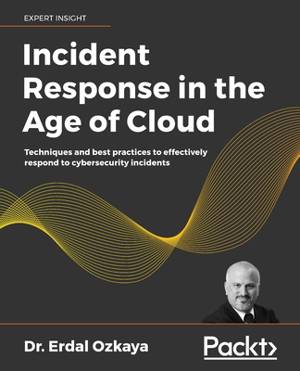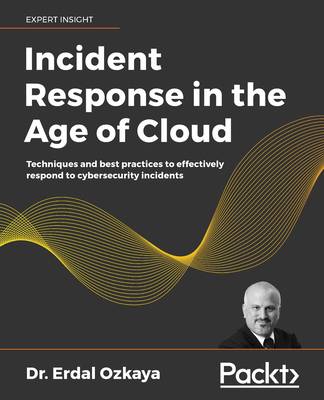
- Retrait gratuit dans votre magasin Club
- 7.000.000 titres dans notre catalogue
- Payer en toute sécurité
- Toujours un magasin près de chez vous
- Retrait gratuit dans votre magasin Club
- 7.000.0000 titres dans notre catalogue
- Payer en toute sécurité
- Toujours un magasin près de chez vous
Incident Response in the Age of Cloud
Techniques and best practices to effectively respond to cybersecurity incidents
Erdal OzkayaDescription
Learn to identify security incidents and build a series of best practices to stop cyber attacks before they create serious consequences
Key Features:
- Discover Incident Response (IR), from its evolution to implementation
- Understand cybersecurity essentials and IR best practices through real-world phishing incident scenarios
- Explore the current challenges in IR through the perspectives of leading experts
Book Description:
Cybercriminals are always in search of new methods to infiltrate systems. Quickly responding to an incident will help organizations minimize losses, decrease vulnerabilities, and rebuild services and processes.
In the wake of the COVID-19 pandemic, with most organizations gravitating towards remote working and cloud computing, this book uses frameworks such as MITRE ATT&CK(R) and the SANS IR model to assess security risks.
The book begins by introducing you to the cybersecurity landscape and explaining why IR matters. You will understand the evolution of IR, current challenges, key metrics, and the composition of an IR team, along with an array of methods and tools used in an effective IR process. You will then learn how to apply these strategies, with discussions on incident alerting, handling, investigation, recovery, and reporting.
Further, you will cover governing IR on multiple platforms and sharing cyber threat intelligence and the procedures involved in IR in the cloud. Finally, the book concludes with an "Ask the Experts" chapter wherein industry experts have provided their perspective on diverse topics in the IR sphere.
By the end of this book, you should become proficient at building and applying IR strategies pre-emptively and confidently.
What You Will Learn:
- Understand IR and its significance
- Organize an IR team
- Explore best practices for managing attack situations with your IR team
- Form, organize, and operate a product security team to deal with product vulnerabilities and assess their severity
- Organize all the entities involved in product security response
- Respond to security vulnerabilities using tools developed by Keepnet Labs and Binalyze
- Adapt all the above learnings for the cloud
Who this book is for:
This book is aimed at first-time incident responders, cybersecurity enthusiasts who want to get into IR, and anyone who is responsible for maintaining business security. It will also interest CIOs, CISOs, and members of IR, SOC, and CSIRT teams. However, IR is not just about information technology or security teams, and anyone with a legal, HR, media, or other active business role would benefit from this book. The book assumes you have some admin experience. No prior DFIR experience is required. Some infosec knowledge will be a plus but isn't mandatory.
Spécifications
Parties prenantes
- Auteur(s) :
- Editeur:
Contenu
- Nombre de pages :
- 622
- Langue:
- Anglais
Caractéristiques
- EAN:
- 9781800569218
- Date de parution :
- 25-02-21
- Format:
- Livre broché
- Format numérique:
- Trade paperback (VS)
- Dimensions :
- 190 mm x 235 mm
- Poids :
- 1052 g

Les avis
Nous publions uniquement les avis qui respectent les conditions requises. Consultez nos conditions pour les avis.






